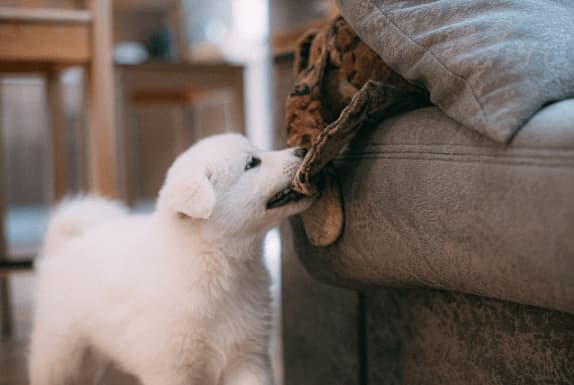Puppies are naturally curious and playful, and biting is a common behavior in their early development. While it may seem harmless at first, it’s crucial to address it early to prevent it from becoming a habit. Learning how to stop a puppy from biting ensures they grow into a well-mannered adult dog.
In this guide, we’ll explore why puppies bite, proven training techniques, and step-by-step strategies to manage and stop this behavior effectively.

Why Do Puppies Bite?
Understanding the root causes of puppy biting will help you apply the best training techniques. Here are the most common reasons:
- Teething Discomfort – Puppies experience gum pain as their new teeth emerge, prompting them to chew on objects for relief.
- Playful Behavior – Puppies often use their mouths during play as they learn proper interaction.
- Exploring Their Environment – Like human infants, puppies explore the world by mouthing objects.
- Overexcitement – High energy levels can lead to impulsive nipping.
- Instinctual Behavior – Certain breeds, such as herding dogs, have a natural tendency to nip or mouth.
How to Stop a Puppy from Biting: 9 Effective Strategies
1. Teach Bite Inhibition
Bite inhibition helps puppies learn to control the force of their bite.
- If your puppy bites too hard, say “Ouch!” in a firm yet calm tone.
- Immediately stop playing and ignore them for a brief period.
- Resume interaction only when they are calm.
- Repeating this method consistently helps them associate biting with losing attention.
2. Redirect Biting to Chew Toys
- Keep chew toys or teething rings accessible at all times.
- If your puppy starts biting your hands or clothing, immediately offer them a toy.
- Praise and reward them when they chew on a toy instead of biting.
3. Establish the “No Biting” Rule
- If your puppy attempts to bite, say “No biting” firmly and stop engaging.
- Give them a brief timeout before re-engaging.
- Reward calm and gentle behavior to encourage positive habits.
4. Avoid Encouraging Rough Play
- Never use your hands to wrestle or roughhouse with your puppy.
- Instead, play structured games like fetch or tug-of-war using appropriate toys.
- If they get too excited and start nipping, pause the game until they settle.
5. Train with the “Leave It” Command
Teaching impulse control through commands can help prevent excessive biting.
- Hold a treat in your closed hand.
- Let your puppy sniff or paw at your hand without opening it.
- Once they stop trying, say “Leave it” and reward them.
- Repeat this training to reinforce self-control.
6. Socialize Your Puppy
Proper socialization helps puppies learn appropriate behaviors.
- Arrange puppy playdates with well-behaved dogs.
- Enroll in puppy training classes to reinforce good habits.
- Expose them to different environments, people, and experiences to reduce fear-based nipping.
7. Provide Enough Physical and Mental Stimulation
A well-exercised puppy is less likely to bite due to excess energy.
- Ensure daily walks and play sessions to burn off energy.
- Use interactive toys and puzzles to keep them mentally engaged.
- A tired puppy is less likely to resort to biting for attention.
8. Use Positive Reinforcement
- Praise and reward your puppy when they interact gently.
- Use a calm, firm voice instead of yelling to discourage biting.
- Ignore them when they bite and reward them when they stop to reinforce non-biting behavior.(How to Stop a Puppy from Biting)
9. Be Consistent with Training
- Ensure all family members follow the same training rules.
- If one person allows biting and another does not, your puppy will become confused.
- Consistency is key to successfully training your puppy.(How to Stop a Puppy from Biting)
Mistakes to Avoid
❌ Encouraging rough play – Using your hands for play teaches your puppy that biting is acceptable.
❌ Inconsistent training – Clear, consistent expectations are essential for success.
❌ Using physical punishment – Harsh corrections can lead to fear and worsen biting behavior.
When to Seek Professional Help
If your puppy’s biting becomes excessive or aggressive, professional assistance may be needed.
- Consult a veterinarian if sudden behavior changes occur, as medical issues might be a factor.
- Work with a certified dog trainer if basic training techniques are not effective.
FAQs About How to Stop a Puppy from Biting
🐶 How long does it take for a puppy to stop biting?
With consistent training, most puppies reduce biting by 4 to 6 months of age.
🐶 Is biting a sign of aggression?
Not necessarily. Most puppy biting is part of normal development, but persistent rough biting should be addressed.
🐶 Should I allow my puppy to nibble on my fingers?
No. Always redirect them to a chew toy to prevent reinforcing bad habits.
Conclusion
Learning how to stop a puppy from biting requires patience, consistency, and the right training approach. By teaching bite inhibition, redirecting behavior, promoting structured play, and using positive reinforcement, you can guide your puppy toward proper behavior.
Start early and stay consistent to help your puppy grow into a well-mannered adult dog. By following these expert-recommended techniques, you’ll set your puppy up for success as a gentle and well-behaved companion.

